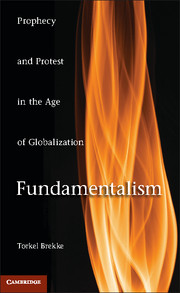Book contents
4 - Prophecy and Preaching
from Part I - The Historical and Ideological Context of Fundamentalism
Published online by Cambridge University Press: 05 June 2012
Summary
Fundamentalists everywhere display characteristic ways of “doing religion.” These include public preaching, or preaching in the sense of writing polemic texts, to drive home certain ideas in conflict and competition with other views. Fundamentalism, as an attitude toward religion and as a style of religious participation and leadership, draws on the tradition of ethical prophecy found in the Abrahamic religious traditions. It is in this prophetic tradition that the urgency of the fundamentalist message finds its repertoire, and preaching is among the most important elements in this repertoire.
In Chapter 2, I argued that there took place a global diffusion of specifically Protestant Christian styles of religiousness starting in the nineteenth century, in some places early in the century but in most parts of Asia and Africa toward the end. I looked briefly at the work of the great Protestant missionary William Carey to show some of the attitudes and styles that were part of the new global exchange of religiousness between the Protestant Christian West and the rest of the world beginning in the early nineteenth century. I said I would return to this point, and as an example we may take a look at the changes in religious preaching that have taken place in many parts of the world since the nineteenth century.
- Type
- Chapter
- Information
- FundamentalismProphecy and Protest in an Age of Globalization, pp. 88 - 98Publisher: Cambridge University PressPrint publication year: 2011



